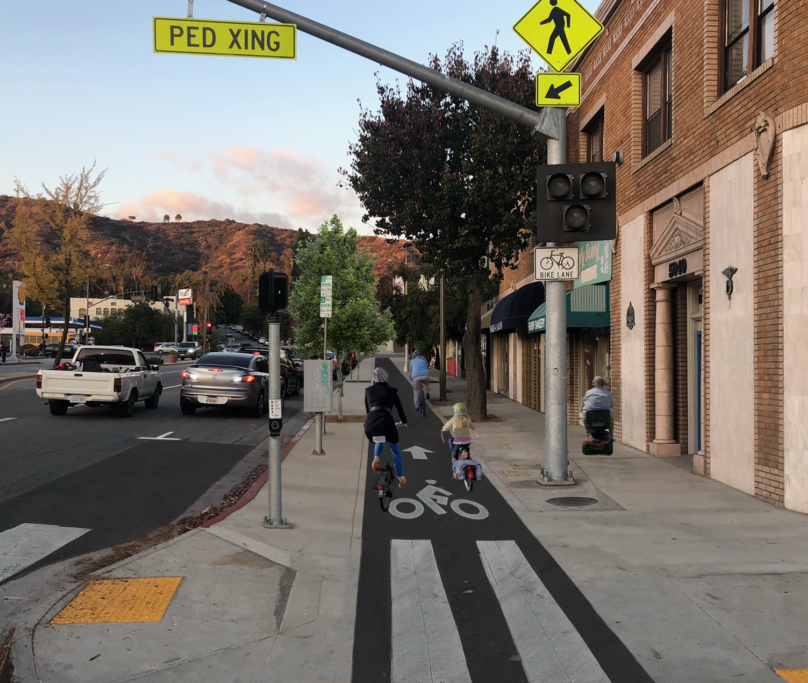Los Angeles City is planning improvements on Northeast Los Angeles' Eagle Rock Boulevard. The project would improve bicycling, walking, and landscaping on a one-mile stretch of Eagle Rock Boulevard from Colorado Boulevard to York Boulevard. The city is seeking public input via a brief online survey that will close this Sunday, April 30.
This Streetsblog post leans heavily on analysis done by community group Equitable Eagle Rock (EER), which led the successful campaign for better BRT on nearby Colorado Boulevard. See the full stories at the EER website: The Walkable Boulevard Concept, Why the Walkable Boulevard?, Why the Median Running Option is Bad, and Share your support for the Walkable Boulevard.
Though overall Eagle Rock Boulevard street widths vary somewhat throughout the project, there is a lot of space to work with as the street is a former rail right-of-way and is especially wide at the north and south ends of the project. The current Eagle Rock Boulevard upgrades grew out of The Eagle Rock Association's (TERA) 2018 Rock the Boulevard initiative, which resulted in the city securing project funding.
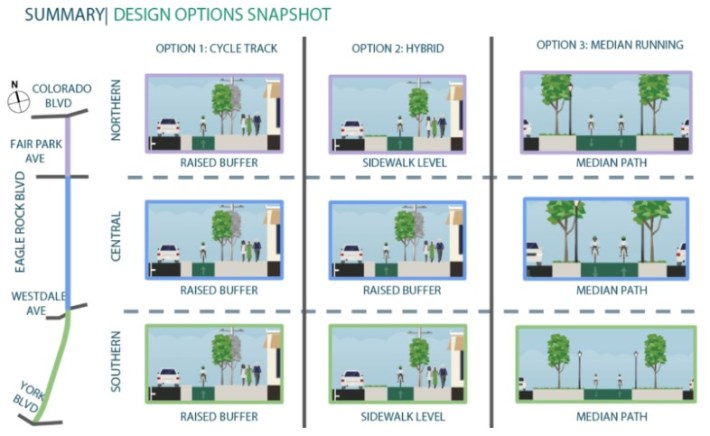
The city, led by StreetsLA (Bureau of Street Services), is currently considering three different design alternatives for the project:
- Option 1: "Cycle Track" would add street-level protected bike lanes, mostly parking-protected, running along the curb. The design is more-or-less the same as other protected bike lanes in L.A. City, and is basically what the community visioning process recommended in 2018.
- Option 2: "Hybrid” is similar to Option 1, but would run much of the protected bike lane at the sidewalk level. This design would be somewhat innovative for Los Angeles, though the design is common in Latin American and European countries - including Denmark and the Netherlands, where bicycling is widespread.
- Option 3: "Median Running” would widen an existing median on Eagle Rock Boulevard and put a two-way bikeway in the middle of the street. This center-running design is perhaps workable in some settings, but many bike advocates dismiss it. One has described center-running designs as a "known infrastructure failure."
All the options introduce protected bike lanes in some form.
Equitable Eagle Rock is sounding an alarm against Option 3. EER notes that Option 3 was developed internally by StreetsLA, bypassing the community process that led to a design that closely mirrors Options 1 and 2. EER points out that a center-running bikeway would actually make conditions worse for all road users, especially pedestrians. Option 3 would put fast-moving car traffic closer to the sidewalk, and for several blocks, eliminate parking that acts as a barrier and spacer separating pedestrians from traffic today.
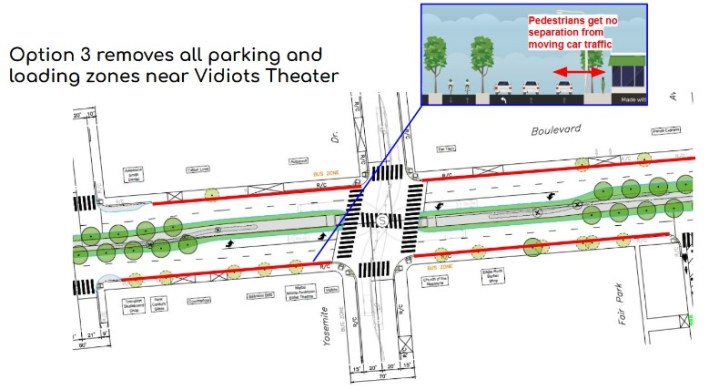
Option 3 is likely to be uncomfortable for bicyclists, too, who would be sandwiched between four to five lanes of car traffic. The center-running bikeway would have some buffer (only five feet in some areas) but that center buffer is narrower than the other options. The curb-running protected lanes offer a minimum of ten feet of separation (a three-foot buffer plus parked cars, usually seven feet).
Most problematic though is that a median running bikeway would also make it difficult for cyclists to access homes, businesses, and side streets. Option 3 appears to be designed as a sort of recreational bicycling greenway, not an everyday transportation bikeway.
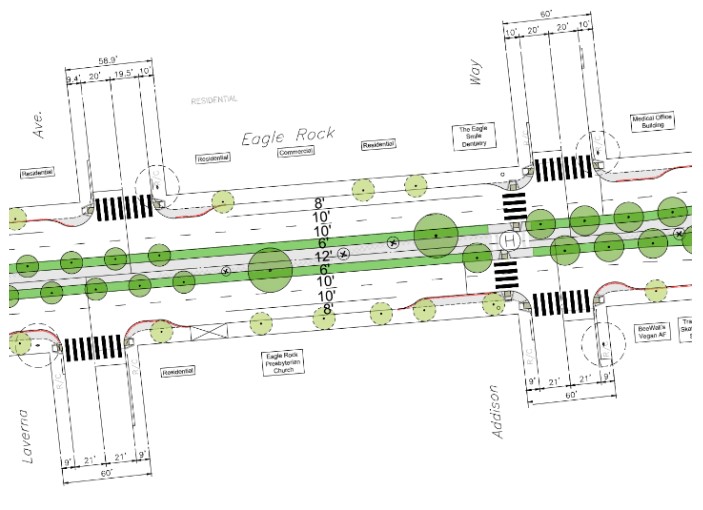
Option 3 is not even a particularly good plan for drivers because, to make room for central buffers, it would remove quite a few on-street parking spaces.
Among the city's choices, Equitable Eagle Rock most supports Option 2 because it is the only option that widens sidewalks along the wider southern and northern parts of Eagle Rock Boulevard. It also adds the most sidewalk street trees where people walk, dine, and wait at bus stops. Because Option 2 does the most to widen sidewalks, it also does the most to reduce pedestrian crossing distances.
But EER has gone a little further, proposing a modified design that it says is consistent with the spirit and intent of the 2018 community visioning process. The proposal is titled the Walkable Boulevard, described in detail on the EER website. In the wider parts of the boulevard, the Walkable Boulevard design includes doubling sidewalk widths, adding protected bike lanes, and installing a linear recreational walking path in the median.

The Walkable Boulevard would allow sidewalks to be doubled in width in the southern and northernmost parts of the project.
EER notes that the Walkable Boulevard proposal is essentially a modified version of Option 2, which saves the most on-street parking (good for drivers) and would add sidewalk level protected bike lanes (good for bicyclists). Both Option 2 and Walkable Boulevard would run on street level in the central portion of Eagle Rock Boulevard, where space is more limited.
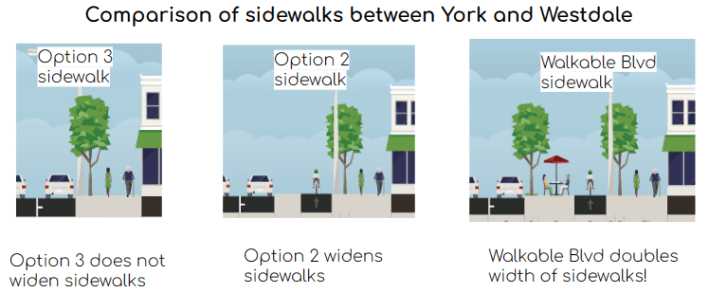
What option do you prefer? Let the city know by taking their online survey by April 30. Equitable Eagle Rock is encouraging people to rank Option 2 as their first choice and Option 3 as their last choice. EER's "Take Action" page lets interested people know how to help support the Walkable Boulevard concept - including sending an email to decision-makers. EER's Walkable Boulevard design is supported by Streets For All, L.A. Walks, Climate Resolve, and BikeLA.
Ultimately, StreetsLA and Council District 14 will be selecting which design proceeds to construction, likely to start in 2025.
